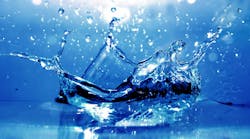By Patrick Crow, Washington Correspondent
Water groups have given mixed reviews to a bill that would establish a federal trust fund for financing water infrastructure improvements.
Rep. Earl Blumenauer (D-Ore.) introduced the Water Protection and Reinvestment Act in the House of Representatives. The Transportation and Infrastructure Committee’s Water Resources and Environment Subcommittee subsequently held a hearing on it.
The legislation would establish a water trust fund, similar to the highway trust fund, to provide about $10 billion per year for wastewater and drinking water infrastructure. A primary goal of the bill was to provide more reliable funding than has been available through yearly congressional appropriations via the water and wastewater state revolving funds.
Blumenauer’s bill would not build the fund through water taxes or user fees. It would use new corporate taxes and fees on bottled beverages, flushable products (like toothpaste and toilet paper), pesticides, fertilizers, and pharmaceuticals.
A third of the money in the trust fund would be earmarked for metropolitan utilities serving more than 100,000 people, reflecting complaints that urban water systems have been shortchanged by the existing state revolving funds.
At the subcommittee hearing, Blumenauer said U.S. utilities face a $300-500 billion funding gap over the next several decades if they are to replace aging water infrastructure.
The National Association of Clean Water Agencies strongly supported the Blumenauer bill. It said the nation’s water quality gains under the 1972 Clean Water Act have leveled off.
It asked, “If highways merit a trust fund with $30 billion per year, and airports $10 billion per year, why should we not have one for water, a resource each of us uses every single day?”
The Water Infrastructure Network also supported the bill. It is coalition of 50 groups -- including the National Association of Clean Water Agencies and the American Public Works Association.
The coalition said the bill would create nearly 2 million jobs in the short term and help make American industry more competitive.
The American Water Works Association was neutral on the bill and skeptical about using a trust fund.
Instead, it proposed that Congress create a federal water infrastructure bank to provide direct, low-interest financing or loan guarantees for projects of regional or national significance. It said that replacing aging water infrastructure should be addressed through local funding decisions rather than reliance on the federal government.
The Association of Metropolitan Water Agencies took no position on whether to use a trust fund versus other methods of infrastructure financing. It did applaud the bill’s funding priority for metropolitan utilities.
The Water and Wastewater Equipment Manufacturers Association opposed creating a water and wastewater trust fund. It said federal subsidies send consumers false price signals about the true cost of water and discourage conservation and sound resource management.
The National Association of Water Companies voiced the same objection. It said, “Aggregate water use can only be reduced by changing the way people think about flushing their toilets, watering their lawns and washing their dishes and how industries think about water as an input cost.”
The International Bottled Water Association said it supported measures to improve the U.S. water infrastructure system but not new taxes on bottled water. It said it would be unfair to tax water-based beverages while exempting the many other food and non-food manufacturers that also use municipal water.
Water System Security
Key players in the House Energy and Commerce Committee are pushing a bill to update the Environmental Protection Agency’s program to guard drinking water systems against terrorist acts.
The Drinking Water System Security Act would require EPA to establish risk-based performance standards for community water systems serving more than 3,300 people and other public water systems that might have security risks.
Principal authors of the bill are committee chairman Henry Waxman (D-Calif.) and Energy and Environment Subcommittee chairman Edward Markey (D-Mass.). They plan to hold hearings on the bill in the fall.
The Association of Metropolitan Water Agencies, several labor unions, and environmental groups support the legislation.
Under the bill, EPA would categorize water systems in one of four risk-based tiers. The systems would develop security plans -- and update them every 5 years -- to counteract their vulnerabilities.
Water systems that use dangerous chemicals (such as chlorine gas) in certain volumes would have to consider switching to safer chemicals or processes to reduce the consequences of a terrorist act. States might push for a switch, but EPA could not force utilities to change their disinfection processes.
The bill requires water utilities to include their employees in the development of security vulnerability assessments and site security plans.
In other Washington news:
- – The U.S. Senate has confirmed the nomination of Peter Silva to be EPA’s assistant administrator for water. Silva, a civil engineer, most recently was a policy advisor to the Metropolitan Water District of Southern California.
– Administrator Lisa Jackson said EPA will seek public comment on a reevaluation of the scientific data on perchlorate in drinking water, especially regarding the chemical’s impact on infants and children. Last year EPA made a preliminary decision not to regulate perchlorate.
– Jackson has launched a program to boost enforcement of Clean Water Act rules and improve public access to data on CWA compliance. She said the compliance data would be available to the public in a more user-friendly format.
– The Department of Agriculture has earmarked $57.9 million for 63 projects to conserve water and reduce contaminated run-off from farmland in 21 states. The funding will be through the Agricultural Water Enhancement Program, which was created in the 2008 Farm Bill.
– Following an oversight hearing on bottled water, a House Energy and Commerce subcommittee has asked 13 bottled water companies to submit data on the sources and testing of their water. WW


